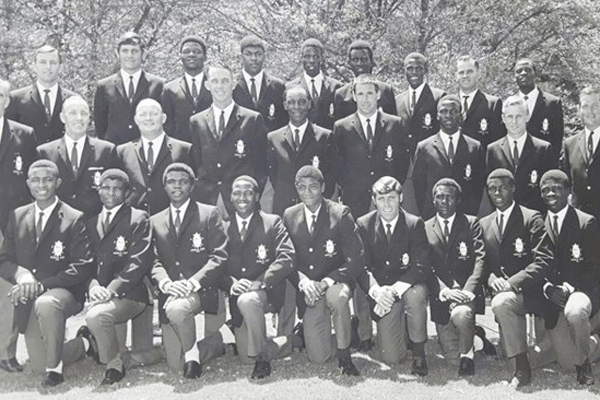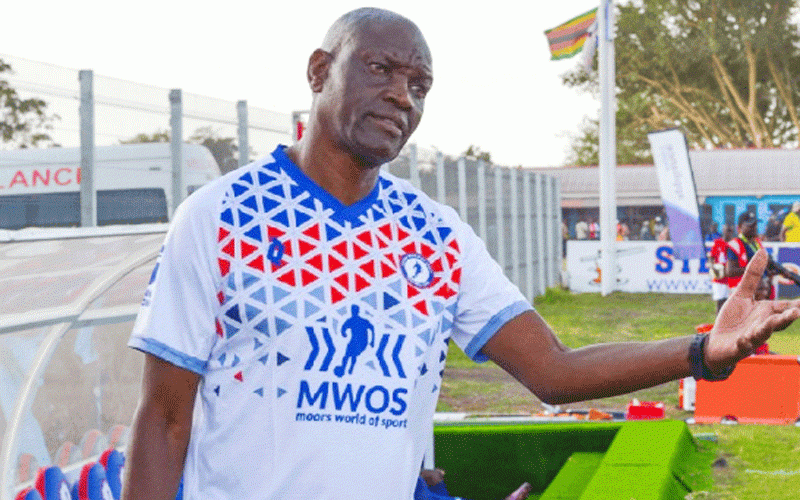
LONDON — Somewhere in Bobby Chalmers’ memorabilia collection is a weathered black and white photograph. And if a picture is worth a thousand words, this image tells an important southern African story of a football squad that was years ahead of its time.
African Football Media
The photograph shows the 1969 Rhodesian football squad ahead of their Fifa World Cup qualifying ties against Australia, with the prolific striker Chalmers in the top row on the left. The text at the bottom reads: R. Chalmers (Capt.).
At the time Rhodesia, which many years later was to become Zimbabwe, was a troubled society. In 1965 the country became independent from Great Britain and transitioned into a racially divided country in which white people, who were little more than a tiny minority in the country, held most of the political and economic power.
It was in these tumultuous times that Rhodesia entered the qualifying campaign for the 1970 Fifa World Cup Mexico and the composition of that side was a strong symbol for proponents of a non-racial society as it was fully multi-racial.
Chalmers remembers the society as less divided than neighbouring South Africa, saying that “people just got on with each other.”
Another striker on the team, Gibson Homela confirmed to Fifa.com that the team were a cohesive unit going into their qualifiers against the Aussies.
- Chamisa under fire over US$120K donation
- Mavhunga puts DeMbare into Chibuku quarterfinals
- Pension funds bet on Cabora Bassa oilfields
- Councils defy govt fire tender directive
Keep Reading
“Football in Rhodesia was always multi-racial, so we played against each other and we played with each other. For us it was not a question of looking at the race of the other player. We were interested in whether he could play, or he could not play.
“We were considered heroes throughout Rhodesia and people recognised us as good players who played for the national team. That was the most important thing they looked at,” Chalmers recalls.
Chalmers and fellow striker Hylton Grainger played in the South African professional league at the time and were called up by Scottish coach Danny McLennan to boost Rhodesia’s chances against the Australians, who went into the matches as overwhelming favourites.
Battle in Lourenco Marques Australia advanced through a preliminary stage against Korea Republic and Japan, and so they were confident coming into the two matches, which were hosted in the Mozambican capital of Lourenco Marques after the Rhodesians had difficulty with visas. “The Australians were so sure of winning, they completely underestimated us. In fact, they had already booked their flights to Israel, whom the winner of our tie would face to decide which team would go onto the World Cup in finals,” remembered Chalmers.
In the first qualifier, it was Chalmers who gave Rhodesia the shock lead on the hour in front of a small crowd in the Salazar stadium, though their lead was cancelled out a few minutes later by Tommy McColl. “[The draw] was a shock for them and they were rather arrogant afterwards, saying they would beat us 6-0 in the second leg.”
The reality was much different as the two teams played to a scoreless draw and thus forcing a tie-breaking match two days after the second leg. In that game, Australia finally converted their chances and ran out 3-1 winners, ending Rhodesia’s unlikely World Cup dreams despite another goal for Chalmers.
Although he enjoyed a successful career in South Africa and scored twice in a friendly against the great Real Madrid side consisting of the likes of Puskas, Gento and Santamaria, Chalmers still considers the World Cup qualifiers as the highlight of his career.
“It was a wonderful experience, although it ended in disappointment. Four years later, many of the same players that played against us, qualified for the World Cup finals in Germany. And of course we were thinking it could have been us four years earlier.”
Both Chalmers and Homela agree that qualifying for the World Cup finals in Mexico might have helped the country along its oft-difficult transition into life as Zimbabwe.
“It would have sent a huge sign to all Rhodesians that we can transcend racial divisions. If we work together we can overcome all obstacles,” Homela recalled.
After being knocked out by Australia, Rhodesia had to wait another 11 years to play a World Cup qualifier — then as Zimbabwe —where they were defeated by Cameroon.
The Warriors have never reached the finals of the World Cup, and were expelled from qualifying for Russia 2018 before it started, but recently qualified for their third CAF Africa Cup of Nations — to be hosted next year in Gabon.
The teams hoping to reach Qatar 2022 and beyond would do well to remember the pioneering side of 1969.












